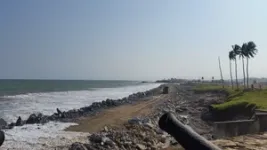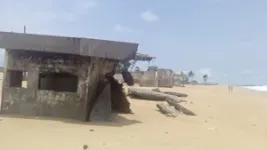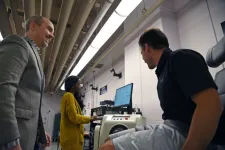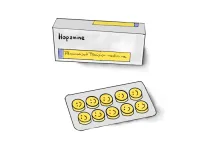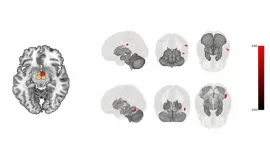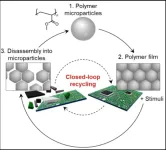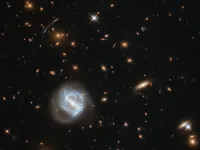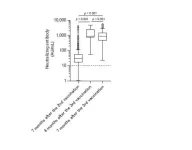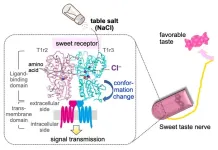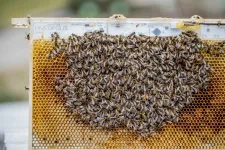(Press-News.org) Issues around the loss of coastal heritage due to climate change and how these can be effectively addressed in policy will be discussed during a major conference taking place at the University of East Anglia (UEA) next week.
The conference will discuss a range of pressing issues including how behavioural science can inform choices about what should be saved and how archaeological landscapes are valued, to the human cost of heritage loss and the role art and exhibitions play in addressing ecological crisis.
Heritage takes many forms, and includes physical artifacts, buildings and ecosystems, but also the rich cultural and social aspects of people’s lives that are passed down the generations.
Despite the growing realisation that heritage losses due to climate change will be significant in coming decades, current global policies rarely include heritage in their assessments. For example, heritage is hardly mentioned in the UN’s Sustainable Development Goals or routinely included in the Intergovernmental Panel on Climate Change (IPCC) assessments or special reports.
The conference on Thursday March 30 brings together international scholars and policy experts in heritage and climate change to explore how to measure the human cost of Loss and Damage to coastal heritage from climate change related sea-level rise and coastal erosion.
Funded by The British Academy as part of their flagship Conferences series, and organised in partnership with ClimateUEA, the aim is to better align humanities-social science heritage scholarship with science-based climate change scholarship and, ultimately, allow heritage to be integrated into climate change policy assessments.
Prof Joanne Clarke, of UEA’s School of Art, Media and American Studies, is Principal Investigator on the conference and has conducted research on societal responses to climate change in the past and climate change impacts on heritage in Africa. She was a contributing author to the Africa Chapter of the Working Group II contribution to the IPCC’s Sixth Assessment Report.
“We are excited to host this timely conference,” said Prof Clarke. “There is increasing recognition that archaeology and heritage have more to offer climate change policy than has been considered to date.
“However, due to disciplinary differences in methodologies and how data and evidence are expressed and communicated, heritage is not routinely or evenly incorporated in climate change assessment reports.”
Dr Hana Morel of the Museum of London Archaeology (MOLA) and Scientific Coordinator of the International Council on Monuments and Sites (ICOMOS) project, which is lobbying for heritage to be included in climate change policy reporting, said “With Loss and Damage being the breakthrough issue of COP27, the opportunities for heritage are substantial.
“This conference has the potential to inform and establish a position from the social sciences and humanities for the 2023 Glasgow Dialogue and forthcoming Loss and Damage workshops by the United Nations Framework Convention on Climate Change, building towards COP28.”
The conference will include sessions on how climate change is affecting different coastlines, such as those in Ghana, West Africa, and in East Anglia in the UK. Prof Anne Haour, director of UEA’s Centre for African Art and Archaeology, said: “Hosting the conference at UEA is particularly fitting given the research strengths of the university around both climate change and heritage.
“This will give us the opportunity to explore common experiences and challenges across different parts of the world, including the West African coastline, the Caribbean and the Indian Ocean, where speakers – both from UEA, and beyond – have conducted ground-breaking research.”
For many decades UEA has played a pivotal role in researching the environmental and social impacts of changing climate on its regional coastline. Dr Johanna Forster, Associate Professor in Environment and International Development and Associate Pro-Vice-Chancellor (Civic), added: “We are in a unique position, as a civic institution founded by and for the region, but with global impact; this conference showcases and demonstrates the UEA’s commitment to understanding local and global needs.
“The impacts to our regional coastline are front and centre in debates around adapting to climate change, and the inclusion of heritage in these discussions is of paramount importance. The conference will contribute towards this goal.”
The conference - ‘Measuring Heritage Loss and Damage from Climate Change for Effective Policy Reporting’ - features speakers from the Schools of International Development, Economics, and Art, Media and American Studies, and the Tyndall Centre for Climate Change Research at UEA, as well as the University of Ghana, Columbia University, the Climate Change Heritage Network UK, Loughborough University London, University of Southampton and GroundWork Gallery.
Speaker and programme details are available via this link:
https://www.thebritishacademy.ac.uk/events/british-academy-conferences/heritage-loss-damage-climate-change/
END
Measuring impacts of climate change on heritage to be explored at conference
2023-03-23
ELSE PRESS RELEASES FROM THIS DATE:
Tools for more accurate obesity risk assessment based on sex, ethnicity
2023-03-23
For decades, health care practitioners have used body mass index (BMI) as an indicator of a person’s health. But this equation only considers height and weight, and may not capture an accurate picture of a person’s risk for obesity-related diseases, like heart disease, diabetes, and certain cancers.
Jacob Earp, assistant professor of kinesiology in the College of Agriculture, Health and Natural Resources, recently published papers in the International Journal of Environmental Research and Public Health and Nutrition, Metabolism and Cardiovascular Diseases that include a series of equations that add simple circumference measurements to better predict how a person’s ...
Adding hope to the therapeutic mix can empower persons with Parkinson's disease
2023-03-23
Amsterdam, March 23, 2023 – When Marina Noordegraaf was diagnosed with Parkinson's disease at age 49, she noticed when it came to treatment decisions, she sometimes felt powerless. She observed that she herself played an active role in communicating her hopes and wishes to her healthcare professionals, which were not automatically taken into account. She took back control by taking her own hope seriously, prescribing her own recipe of “hopamine,” a self-invented word representing ...
Post-bariatric surgery exercise modulates brain regions associated with regulation of food intake
2023-03-23
Physical exercise practiced by patients submitted to bariatric surgery acts on brain regions involved in food intake, reducing hunger or accelerating satiety, for example. This was the result observed in a clinical trial conducted at Hospital das Clínicas (HC), the hospital complex run by the University of São Paulo’s Medical School (FM-USP) in Brazil. An article on the study, pointing to positive effects of exercise on obesity-related conditions in post-bariatric patients, is published in the International Journal of Obesity.
The study showed that an exercise ...
Closed loop for circular economy: new polymer recycling strategy ensures both high stability and complete recyclability
2023-03-23
The ever-increasing generation of plastic solid waste has resulted in global plastic pollution both on land and in the oceans. Projections show that plastic waste will double in the next 20 years, causing further environmental problems. Large amounts of plastic waste are, at present, incinerated or deposited in landfills. This not only degrades the environment but also depletes valuable resources.
In this light, recycling plastics such as polymers is a promising sustainable alternative for waste management. But this involves the breaking of chemical bonds between ...
Artificial intelligence discovers secret equation for ‘weighing’ galaxy clusters
2023-03-23
Astrophysicists at the Institute for Advanced Study, the Flatiron Institute and their colleagues have leveraged artificial intelligence to uncover a better way to estimate the mass of colossal clusters of galaxies. The AI discovered that by just adding a simple term to an existing equation, scientists can produce far better mass estimates than they previously had.
The improved estimates will enable scientists to calculate the fundamental properties of the universe more accurately, the astrophysicists reported March 17, 2023, in the Proceedings of the National Academy of ...
SARS-CoV-2 mRNA booster vaccinations increased and sustained the antibody responses
2023-03-23
Booster vaccinations against severe acute respiratory syndrome coronavirus 2 (SARS-CoV-2) are being promoted worldwide to counter the coronavirus disease 2019 (COVID-19) pandemic. Recent studies on the effectiveness of the third dose of the vaccine found improved efficacy against SARS-CoV-2 infection and a reduction in hospitalization. However, most studies on the effect of the third vaccination have been limited to a relatively short period of time after the third dose, and few longitudinal analyses of the effects of the third vaccination with an anti−SARS-CoV-2 vaccine have been reported.
Researchers from Tokyo Metropolitan Institute of Medical ...
How salt can taste sweet: the myriad mechanisms of taste perception
2023-03-23
Humans perceive five basic taste sensations: sweet, umami, bitter, salty, and sour. Specific foods trigger taste recognition of these sensations through the activation of different receptors in our taste buds. In the case for table salt, the concentration is also an important factor in determining taste. For instance, the preferable concentration of table salt is 100 mM, at which humans perceive a salty taste. However, higher concentrations of salt, over 500 mM, may be perceived as bitter and/or sour, while very low concentrations, below 10 mM, are perceived as sweet by humans. Scientific ...
mNGS outperforms microbiological tests to diagnose bloodstream infections – BGI Insight
2023-03-23
The research published in the Journal of Infection investigated the use of metagenomic next-generation sequencing (mNGS) in diagnosing bloodstream infections (BSIs) for immunocompromised hematology patients. Hematology patients are highly susceptible to BSIs, which can have severe consequences such as septic shock, multiple-organ failure, disseminated intravascular coagulation, and even death. An accurate and quick microbiological diagnosis of BSI is therefore essential for the control of the infection.
In the study, conducted ...
Beyond ‘good vs. bad’ – A new, more comprehensive approach to evaluate carbohydrate quality and improve health equity
2023-03-23
March 23, 2023 – Despite the broad diversity of the U.S. population, dietary recommendations often overlook the positive contributions of cultural foods to build healthy dietary patterns. This is especially true when it comes to carbohydrate food guidance, where prevailing approaches have historically focused on only three components— carbohydrates, sugar, and dietary fiber—ignoring other important nutrient and cultural considerations. However, a new paper published in Nutrients highlights a more holistic approach, called the Carbohydrate Food Quality ...
Robotic system offers hidden window into collective bee behavior
2023-03-23
Honeybees are famously finicky when it comes to being studied. Research instruments and conditions and even unfamiliar smells can disrupt a colony’s behavior. Now, a joint research team from the Mobile Robotic Systems Group in EPFL’s School of Engineering and School of Computer and Communication Sciences and the Hiveopolis project at Austria’s University of Graz have developed a robotic system that can be unobtrusively built into the frame of a standard honeybee hive.
Composed of an array of thermal sensors and actuators, the system measures and modulates honeybee behavior through ...

